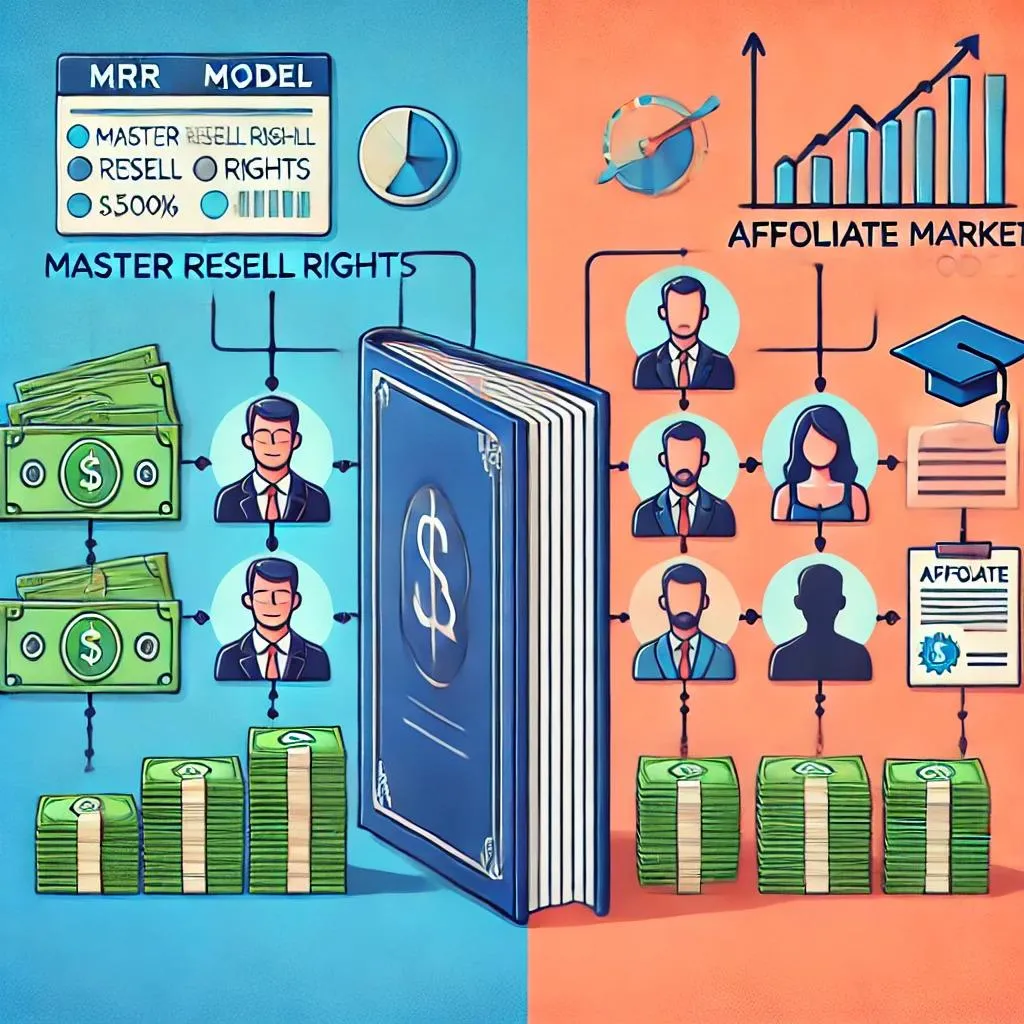Online Marketing Tips Blog
In this Daily blog, I'll try to answer the most burning questions for online marketing that I get in my consulting business. We help online business owners who are in affiliate marketing, coaching, eLearning and Online Events every single day. I'll share that info with you!

Master Resell Rights vs. Affiliate Model for Your Course
Thinking of launching your course but unsure whether to use a master resell rights model or an affiliate model? Let's explore the benefits and drawbacks of each, so you can make an informed decision and maximize your revenue.
Course creators face many decisions, but one of the most important is choosing the right sales model. Should you release your course as a master resell rights model, where you earn money only when you sell directly? Or should you opt for an affiliate model, where you earn no matter who sells the course?
This post will guide you through both models, explaining their mechanics, benefits, and drawbacks. By the end, you'll have a clearer understanding of which approach aligns best with your goals.
Understanding the Master Resell Rights Model
What Are Master Resell Rights?
Master resell rights (MRR) allow purchasers to resell the course and retain 100% of the profits. When you sell your course with MRR, you're essentially granting the buyer the right to become a reseller.
How Does It Work?
When you sell a course under the MRR model, your revenue is generated only when you make the initial sale. The buyer can then sell the course to others, keeping all the subsequent sales revenue. Essentially, you earn once per first line customer.
Who Benefits Most from MRR?
MRR works well for creators who prefer a hands-off approach after the initial sale. It appeals to those who want to quickly generate revenue and move on to creating new content.
Pros of the Master Resell Rights Model
Quick Revenue Generation
One of the primary advantages of the MRR model is the potential for quick revenue generation. You earn your profit upfront when you make the initial sale, which can be appealing if you need immediate funds.
Reduced Ongoing Effort
Once you sell the rights, you don’t have to worry about marketing or customer support for that particular product. The buyer takes on these responsibilities, freeing you up to focus on new projects.
Simplicity in Transactions
The MRR model simplifies transactions. There’s no need to track affiliate commissions or manage ongoing sales processes. You make a sale, hand over the rights, and move on.
Cons of the Master Resell Rights Model
Limited Long-Term Revenue
A significant drawback of the MRR model is the potential for limited long-term revenue. Since resellers keep all profits from subsequent sales, your earnings are capped at the initial sale amount.
Loss of Control Over Pricing
When you sell MRR, you lose control over how your course is priced in the market. Resellers may undervalue your content, which can affect your brand’s reputation and perceived value. Though you can specify a minimum price in your license agreement, controlling that may be very difficult.
Potential for Market Saturation
With multiple resellers not adding value, the market can become saturated quickly. This can reduce the exclusivity and perceived value of your course, leading to decreased sales.
Understanding the Affiliate Model
What Is an Affiliate Model?
In an affiliate model, you partner with affiliates who promote your course in exchange for a commission on each sale they generate. You retain control over the course and continue to receive a share of the revenue.
How Does It Work?
You provide affiliates with unique links or codes to track sales. When a customer purchases your course through an affiliate’s link, the affiliate earns a commission, and you receive the remaining revenue.
Who Benefits Most from Affiliate Models?
The affiliate model suits creators who want to maintain control over their content and pricing while leveraging the marketing efforts of others to boost sales.
Pros of the Affiliate Model
Potential for Ongoing Revenue
The affiliate model offers the potential for ongoing revenue. Affiliates continuously promote your course, generating sales over time. This can lead to a steady stream of income.
Expanded Reach
Affiliates extend your reach by promoting your course to their audiences. This can help you tap into new markets and demographics, increasing your overall sales potential.
Retained Control Over Pricing
Unlike the MRR model, the affiliate model allows you to retain control over your course’s pricing. You set the price, ensuring that your content is valued appropriately.
Cons of the Affiliate Model
Commission Payments
One downside is the need to pay commissions to affiliates. While this incentivizes promotion, it also means you’ll earn less per sale compared to selling directly.
Management and Support
Managing an affiliate program requires ongoing effort. You’ll need to provide marketing materials, track sales, and offer support to your affiliates to keep them motivated and effective.
Variable Performance
Affiliate performance can be variable. Some affiliates may generate significant sales, while others might not contribute much. This unpredictability can make revenue forecasting challenging.
Choosing the Right Model for Your Course
Assess Your Goals
The first step in choosing the right model is to assess your goals. Are you looking for quick revenue, or do you prefer a steady stream of income over time? Understanding your objectives will guide your decision.
Evaluate Your Resources
Consider the resources you have available. If you have the time and capacity to manage an affiliate program, the affiliate model might be suitable. If you prefer a hands-off approach, MRR could be a better fit.
Analyze Your Audience
Think about your audience and their preferences. If they value exclusivity and are willing to pay a premium, MRR might be appealing. If they appreciate recommendations from influencers or affiliates, the affiliate model could be more effective.
Choosing between a master resell rights model and an affiliate model for your course depends on your goals, resources, and audience. Each model has its own set of advantages and drawbacks, and the right choice varies from creator to creator.
If you’re looking for quick revenue and a hands-off approach, the MRR model might be your best bet. On the other hand, if you want to build long-term income and leverage the marketing power of affiliates, the affiliate model could be more advantageous.
No matter which model you choose, remember that your course’s success ultimately depends on its quality and the value it provides to your audience. Make sure to create compelling content that meets their needs and exceeds their expectations.
Ready to take the next step? Sign up for our free Facebook Mastermind Group where we talk about all things online marketing!
https://www.allaffiliatecash.com/fb-group
#MasterResellRights #AffiliateMarketing #CourseRevenue #OnlineCourseSuccess #MRRvsAffiliate #MonetizeYourCourse
If you have specific questions you would like to see answered in this blog, please send them to me at [email protected]. I will try to address every question here.
If you follow the links in my blog, some of them will be affiliate links and I will be compensated if you purchase a course or product from these links. This is no way increases your price or changes my opinion on these courses. I only recommend things I use in my business.
For the absolute best training online for Affiliate Marketing, Coaching, Events & Masterminds and eLearning - Online Courses: Check out our Flagship Program Here.

Copyright © 2025 | All Affiliate Cash | All Rights Reserved
There may be affiliate links on these pages. When you follow them and purchase something, I may be paid a commission. This does not raise your cost of the item, and does not influence my opinion or review of the item in any way.
NOT FACEBOOK™: This site is not a part of the Facebook™ website or Facebook Inc. Additionally, This site is NOT endorsed by Facebook™ in any way. FACEBOOK™ is a trademark of FACEBOOK™, Inc.

